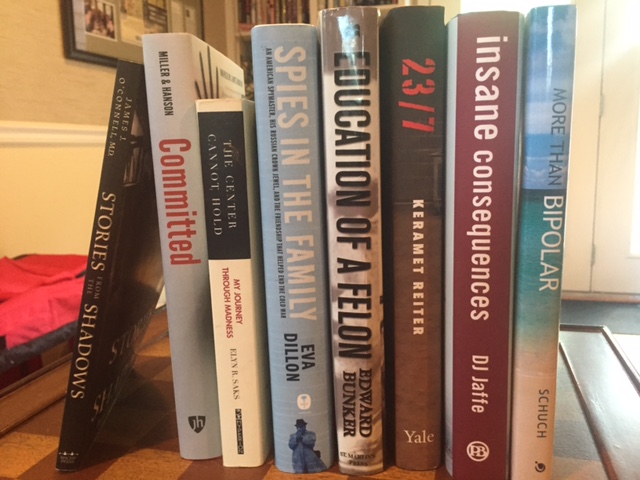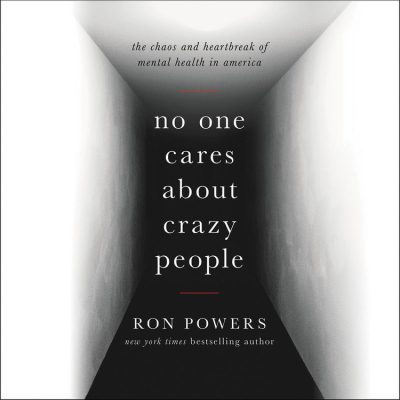
(8-4-17) Books, books and more books. Summer is the time for reading, especially if you are at the beach. Here are several books for you to consider. Feel free to add your own on my Facebook page.
Mental Illness
Everyone is taking about No One Cares About Crazy People: The Chaos and Heartbreak of Mental Health in America by Ron Powers. He drew a big and well-deserved crowd at NAMI’s national convention when he spoke about his book, which combines the history of mental illness with his own family’s story. Kirkus Reviews gave it a starred review, signifying its quality.
”Pulitzer Prize-winning journalist Powers (Mark Twain: A Life, 2005, etc.) presents two searing sagas: an indictment of mental health care in the United States and the story of his two sons with schizophrenia …. This hybrid narrative, enhanced by the author’s considerable skills as a literary stylist, succeeds on every level.”
The New York Times Book Review raved:
“Extraordinary and courageous . . . No doubt if everyone were to read this book, the world would change.”
STORIES FROM THE SHADOWS: Reflections of A Street Doctor by Dr. James J. O’Connell remains the best book that I’ve ever read about a kind-hearted street doctor helping the homeless.
“This volume instantly and irrevocably transports you into a fascinating universe of individuals usually invisible to us… often faceless and nameless, lost in plain sight, and forced to live on the fringes of society. But this volume makes unforgettable those who are usually forgotten. The riveting stories presented here capture each life in such moving and vivid detail that you will be forever changed.”
COMMITTED: The Battle Over Involuntary Psychiatric Care by Drs. Dinah Miller and Annette Hanson educates readers about the never-ending argument sparked by Assisted Outpatient Treatment and involuntary care. An important book that puts human faces on the civil rights vs forced care debate.
“In Committed, psychiatrists Dinah Miller and Annette Hanson offer a thought-provoking and engaging account of the controversy surrounding involuntary psychiatric care in the United States. They bring the issue to life with first-hand accounts from patients, clinicians, advocates, and opponents. Looking at practices such as seclusion and restraint, involuntary medication, and involuntary electroconvulsive therapy―all within the context of civil rights―Miller and Hanson illuminate the personal consequences of these controversial practices through voices of people who have been helped by the treatment they had as well as those who have been traumatized by it.”
INSANE CONSEQUENCES: How the Mental Health Industry Fails the Mentally Ill by D.J. Jaffe is a thoroughly researched attack on the status quo and those who profit from it while demanding that more attention be paid to serious disorders.
“DJ Jaffe blames the mental health industry and the government for shunning the 10 million adults who are the most seriously mentally ill–mainly those who suffer from schizophrenia and severe bipolar disorder–and, instead, working to improve “mental wellness” in 43 million others, many of whom are barely symptomatic.”
THE CENTER CANNOT HOLD: My Journey Through Madness by Elyn Saks continues to be one of the finest books written about living with schizophrenia.
The Center Cannot Hold is the eloquent, moving story of Elyn’s life, from the first time that she heard voices speaking to her as a young teenager, to attempted suicides in college, through learning to live on her own as an adult in an often terrifying world. Saks discusses frankly the paranoia, the inability to tell imaginary fears from real ones, the voices in her head telling her to kill herself (and to harm others); as well the incredibly difficult obstacles she overcame to become a highly respected professional.
A lesser known memoir but one filled with terrific insights is MORE THAN BIPOLAR: A Memoir of Acceptance and Hope by Lizabeth D. Schuch.
Until she experienced her first manic episode at the age of seventeen, author Lizabeth D. Schuch had little knowledge of mental illness. From that point on, her life would never be the same. In her memoir, More Than Bipolar, she discusses her twenty-five years of experience with bipolar disorder, sharing the wisdom attained to break the hold of stigma, shame, and fear surrounding this illness.
MY LOVELY WIFE IN THE PSYCH WARD. Mark Lukach’s new memoir about romance, love and mental illness is both inspiring and spellbinding.
A heart-wrenching, yet hopeful, memoir of a young marriage that is redefined by mental illness and affirms the power of love.
Mark and Giulia’s life together began as a storybook romance. They fell in love at eighteen, married at twenty-four, and were living their dream life in San Francisco. When Giulia was twenty-seven, she suffered a terrifying and unexpected psychotic break that landed her in the psych ward for nearly a month. One day she was vibrant and well-adjusted; the next she was delusional and suicidal, convinced that her loved ones were not safe.
Books about spies and prison
SPIES IN THE FAMILY by Eva Dillion is getting much well-deserved attention in the intelligence community.
In the summer of 1975, seventeen-year-old Eva Dillon’s family was living in New Delhi when her father was exposed as a CIA spy. Eva had long believed that her father was a U.S. State Department employee. She had no idea that he was handling the CIA’s highest-ranking double agent—Dmitri Fedorovich Polyakov—a Soviet general whose code name was TOPHAT. Dillon’s father and Polyakov had a close friendship that went back years, to their first meeting in Burma in the mid-1960s. At the height of the Cold War, the Russian offered the CIA an unfiltered view into the vault of Soviet intelligence.
Books about prisons are generally not light summer reading. But if you are interested in a memoir by a convict turned Hollywood screenwriter and actor, check out an older book called EDUCATION OF A FELON by Edward Bunker. It doesn’t get any more real than this book.
The son of an alcoholic stagehand father and a Busby Berkeley chorus girl, Bunker was–at seventeen–the youngest inmate ever in San Quentin. His hard-won experiences on L.A.’s meanest streets and in and out of prison gave him the material to write some of the grittiest and most affecting novels of our time.
From smoking a joint in the gas chamber to leaving fingerprints on a knife connected to a serial kiler, from Hollywood’s steamy underside to swimming in the Neptune pool at San Simeon, Bunker delivers a memoir as colorful as any of his novels and as compelling as the life he’s lead.
23/7: Pelican Bay Prison and the Rise of Long-Term Solitary Confinement by Keramet Reiter is a throughly researched book that should and needs to be read by every American. It reveals the horrors of solitary confinement and how our society has ignored the damage that it causes on our fellow human beings.
Originally meant to be brief and exceptional, solitary confinement in U.S. prisons has become long-term and common. Prisoners spend twenty-three hours a day in featureless cells, with no visitors or human contact for years on end, and they are held entirely at administrators’ discretion. Keramet Reiter tells the history of one “supermax,” California’s Pelican Bay State Prison, whose extreme conditions recently sparked a statewide hunger strike by 30,000 prisoners.
I am grateful to all of these authors for their courage and dedication to giving voices to those seldom heard and shinning spotlights into institutions rarely seen.
(All quotes either came from book jackets or reviews.)




